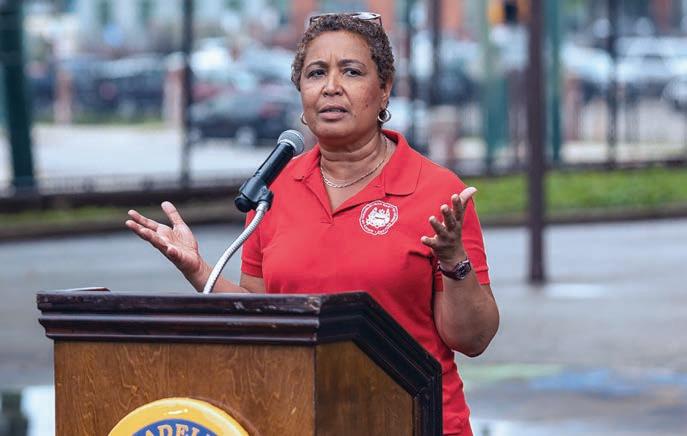
8 minute read
CULTURE | CULTURA
Cover Book ‘How Not to Drown in a Glass of Water’ .
Advertisement
La comunidad latina tiene muchas historias que contar que no han sido representadas en el mainstream.
ENGLISH ESPAÑOL
Angie Cruz grew up in Washington Heights, NY, in a Spanish-speaking Dominican family, and as a child never imagined she would become a writer. “This is probably because I had yet to read a book by a person of color, let alone a Latina, Caribbean, Dominican women like me,” she recalled in a recent interview with AL DIA News.
Cruz has just published her fourth novel, How Not to Drown in a Glass of Water (Flatiron, Sept 13) a story starring Cara Romero, a Dominican American woman in her mid-50s who loses her job in a lamp factory during the 2008 recession and she is forced back into the job market for the fi rst time in decades. Over the course of her sessions with a job counselor, Cara recounts her tempestuous love affairs, her alternately biting and loving relationships with her neighbor Lulu and her sister Angela, her struggles with debt, gentrifi cation and loss, and, eventually, what really happened between her and her estranged son, Fernando.
“Cara Romero was born in 2017 when Trump was president and I was feeling a lot of despair in my life. I had not found a publisher for my previous book, Dominicana, and I was seriously thinking about going back to school to study immigration law or some fi eld where I could really help people. But then one day while waiting for a train in NYC just when I wanted to quit this entire writing business Cara Romero began speaking to me,” the author recalled. “I wrote everything she said to me. I never had a fi ctional character speak to me so clearly. She reminded me why stories matter. Why writing our stories matter. How listening to other people’s stories can be medicine for both the storyteller and listener,” Cruz added.
The truth is that stories have always been present in Cruz’s life. Although being a writer was not something she w ing time with my grandmother who spun arresting and hilarious tales in her kitchen,” she recalled.
But what prompted her to take up writing professionally was to start reading books by women writers from the African and Latin American diaspora. “I wanted to be in conversation with them. I had a tough childhood but books gave me language and a key to imagine a different world and life. Writing my fi rst novel, Soledad, was an opportunity to think through the realities I was witnessing but also I was writing a book that I wanted to read”, the author explained.
HAVING A VOICE
According to Cruz, the Latino community “has a lot of stories to tell that have not been represented in the mainstream. We make up a large percentage of the United States and it’s exciting to see so many new voices,” she said. “The more of us that get published the more interesting all of our writing will become because we are learning from each other as we innovate and expand the American literary canon how to fl ex the breadth and depth of our languages, experiences and countries.”
Although Spanish was the language spoken in her home, English is the language she uses to write her books. A ngie Cruz creció en Washington Heights, NY, en el seno de una familia dominicana hispanohablante. De pequeña nunca imaginó que acabaría siendo escritora. “Probablemente porque aún no había leído un libro de una persona de color, y mucho menos de una mujer latina, caribeña y dominicana como yo”, recuerda en una entrevista con AL DIA.
Cruz acaba de publicar su cuarta novela, ‘How Not to Drown in a Glass of Water’ (‘Cómo no ahogarse en un vaso de agua’), una historia protagonizada por Cara Romero, una dominicana que se ve obligada a buscar trabajo por primera vez en décadas al perder su empleo en una fábrica de lámparas.
A partir de sus sesiones con una consejera de empleo, Cara empezará a narrar la historia de su vida, desde sus líos amorosos y su complicada relación con su vecina Lulu y su hermana Angela, a sus difi cultades fi nancieras, la amenaza de la gentrifi cación o descubrir que su hijo es homosexual.
“Cara Romero nació en 2017 cuando Trump era presidente y yo entonces sentía mucha desesperación en mi vida. No encontraba una editorial para mi anterior libro, Dominicana, y estaba pensando seriamente en ponerme a estudiar derecho de inmigración o algún campo en el que realmente pudiera ayudar a la gente. Pero un día, mientras esperaba un tren en Nueva York, justo cuando quería tirar la toalla con la escritura, Cara Romero empezó a hablarme,” dijo Cruz a AL DIA.
“Escribí todo lo que me dijo. Nunca un personaje de fi cción me había hablado tan claramente. Me recordó por qué las historias son importantes. Por qué importa escribir nuestras historias. Cómo escuchar las historias de otras personas puede ser una medicina, tanto para el narrador como para el oyente”, contó
Lo cierto es que las historias siempre han estado presentes en la vida de Cruz. “Vengo de una familia de narradores increíbles. Ahora que recuerdo esa época de mi vida, me doy cuenta de lo mucho que aprendí sobre contar historias pasando tiempo con mi abuela, que hilaba cuentos apasionantes e hilarantes en su cocina”, recordó.
Pero lo que la impulsó a dedicarse a la escritura de forma profesional fue empezar a leer libros escritos por mujeres procedentes de la diáspora africana y latinoamericana. “Quería conversar con ellas. Tuve una infancia dura, pero los libros me dieron el lenguaje y la clave para imaginar un mundo y una vida diferentes. Escribir mi primera novela, Soledad, y fue una oportunidad para refl exionar sobre las realidades que estaba presenciando, pero también estaba escribiendo un libro que me gustaría leer,” explicó.
TENER UNA VOZ
Según Cruz, la comunidad latina de Estados Unidos tiene muchas historias para contar que
“ I learned English from music and tv and then at school. So English is my academic language. It would have been great if schools offered dual language education, then I would be versed in both languages. Unfortunately xenophobia has robbed us from access,” she explained.
LEANING INTO CURIOSITY
In addition to being a writer, Cruz is also an editor and founder of the literary journal Aster(ix) and Writing professor at the University of Pittsburgh. One of her professional principles is to believe that everyone has something to say if they lean into their curiosity, so she asks her students to write into what they don’t know or understand. “For example, to look directly at someone or something that makes them uncomfortable, people they disagree with, things that seem mysterious to them. I encourage my students to read their drafts and spend the time researching the places, beings, and objects they are writing about, and see what else they discover that can enrich their work. The thing about curiosity is that it takes time to follow it and if you are in a rush to fi nish a book in a certain amount of time, taking the time to wonder, discover, play may seem for some like a waste of time. But I believe it’s the shortest way to a great book,” she said.
Among her students there are people of color, whom she prepares to combat the two main diffi culties that she believes the future holds for them: Invisibility and presumed incompetence. “But maybe the most exciting thing I see happening with writers of color, especially those of us leaning into an interdependent, collectivist model is that we are in this together and there doesn’t have to be only one of us getting all the cookies. We can share the cookies. And together we can create a more liberating sustainable model to live and write,” she concluded. z
ENGLISH ESPAÑOL
no han sido representadas en el mainstream. “Constituimos un gran porcentaje de los Estados Unidos y es emocionante ver tantas voces nuevas. Cuantos más de nosotros seamos publicados, más interesante será toda nuestra escritura, porque estamos aprendiendo unos de otros mientras innovamos y ampliamos el canon literario estadounidense”, advirtió. A pesar de que el español era la lengua que se hablaba en su casa, Cruz escribe los libros en inglés. “Aprendí el inglés con la música y la televisión, y luego en la escuela. Así que el inglés es mi lengua académica. Habría sido estupendo que las escuelas ofrecieran una educación en dos idiomas. Por desgracia, la xenofobia nos ha impedido el acceso”, dijo.
ESTIMULAR LA CURIOSIDAD
Cruz es también editora y fundadora de la revista literaria Aster(ix) y profesora de escritura en la Universidad de Pittsburgh. Uno de sus principios es creer que todo el mundo tiene algo que decir si se asoma a su curiosidad, por lo que pide a sus alumnos que escriban sobre lo que no saben o no entienden: “Por ejemplo, que miren directamente a alguien o a algo que les incomoda, a personas con las que no están de acuerdo, a cosas que les parecen misteriosas. Animo a mis alumnos a que lean sus borradores y dediquen tiempo a investigar los lugares, los seres y los objetos sobre los que escriben, y a ver qué más descubren que pueda enriquecer su trabajo”.
Indica que “lo que ocurre con la curiosidad es que se necesita tiempo para seguirla y, si se tiene prisa por terminar un libro, tomarse el tiempo para preguntarse, descubrir y jugar puede parecer para algunos una pérdida de tiempo. Pero creo que es el camino más corto hacia un gran libro”, manifestó. z


Hacer varias tareas a la vez no siempre es la mejor manera de ahorrar.
PECO tiene respuestas energéticas.
Obtenga ayuda de un asesor de energía dedicado de PECO y encuentre herramientas en línea que le muestran todas las formas en que puede ahorrar energía y dinero. Conozca más formas de ahorrar
en peco.com/waystosave.
© PECO Energy Company, 2022. All rights reserved.









